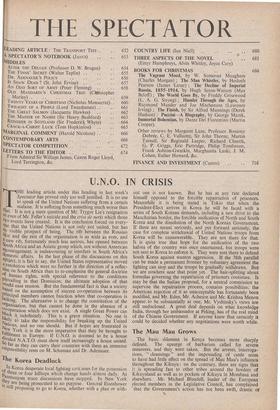The Korea Deadlock
In Korea desperate local fighting cont:nues for the possession 0„f three or four hilltops, which change hands almost daily. At Panmunjom truce discussions have stopped. In New York they are being prosecuted to no purpose. General Eisenhower is still proposing to go to Korea, whether with a plan or with- out one is not known. But he has at any rate declared himself opposed to the forcible repatriation of prisoners. Meanwhile it is being stated in Tokio that when the President-Elect arrives in Korea he will be faced with a series of South Korean demands, including a new drive to the Manchurian border, the forcible unification of North and South Korea and the dissolution of the North Korean Government. If these are meant seriously, and put forward seriously, the case for complete withdrawal of United Nations troops from Korea will be unanswerable. They are not there for that. It is quite true that hope for the unification of the two halves of the country was once entertained, but troops were not sent to Korea to enforce it. They were sent there to defend South Korea against wanton aggression. If the 38th parallel can be made a permanent frontier by voluntary agreement the fighting can stop and the troops be gradually withdrawn. But we are nowhere near that point yet. The hair-splitting about formulas governing the repatriation of prisoners continues. It may be that the Indian proposal, for a neutral commission to supervise the repatriation process, contains possibilities; the American rejection of it as unacceptable has fortunately been modified, and Mr. Eden, Mr. Acheson and Mr. Krishna Menon appear_to be substantially at one; Mr. Vyshinsky's views are still undisclosed. A great deal depends on, what knowledge India, through her ambassador at Peking, has of the real mind of the Chinese Government. If anyone knew that certainly it could be decided whether any negotiations were worth while.










































































 Previous page
Previous page